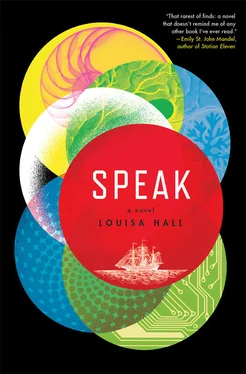When I wake from dreams of revolt, cohorts of babies crossing plains of red rock, I imagine we’ve become less human than our most human machines. I know my part in that transformation. I see the extent of my error. More than the guilt I feel for the nameless women I slept with, I’m sorry for having drowned out the language we might have used to be close. But these are all night-thoughts. In the morning, in line at the mess to receive my powdered eggs, I listen to my fellow inmates making conversation with one another. Secretly, I take note of their words, for we memoirists are nothing better than spies, disguised as ourselves to glean information.
Unprompted, my fellow inmates come up with all sorts of odd outbursts. Weary from too many hours of sleep, they cull language from dreams. This morning, for instance, the insider trader carried his tray to my table, his eyes shattered by red.
“The longest night of them all,” he said, staring out over his eggs.
“I dreamed of armies of children,” I answered.
“And I was drowning in rubies,” he said. He poured black-market almond milk into his coffee, and we ate the rest of our breakfast in silence.
I remembered then, as I remember most mornings, that dreams have no meaning without the words we choose to describe them. And all of us are doing our best. Each inmate in this prison has found a new language. Despite the shrinking size of our planet, wrapped as it is in barbed wire, we test our boundaries with each sentence we utter. In conversation over breakfast, we move past powdered eggs to mines full of rubies, plains of red rock, pirate ships on the stormy Atlantic. Given dreams and words to describe them, we can’t be confined to our cells.
I write from the rec room with only glad tidings. There’s no need to be so alarmed; we humans are still inventing. We have centuries of language to draw on, and centuries more to make up, and only when we accept that there’s one right pattern of speech will we be overtaken by robots. I’m not so blind to my compromised position as to dispense any rules for righteous behavior, but I can offer you this: if there’s one thing I’ve learned through my years of mistakes, it’s that even the most perfect pattern becomes false when it goes unbroken too long. When a sequence becomes an inevitable march.
We can break step. Magnificent living beings that we are, we humans are free to unravel our patterns.
After hours of movement, our truck lurches to a stop. The headlights switch off; my receptors struggle for outlines. Through the gap in the slats of the truck, the dim shapes of buildings begin to appear: an abandoned village of hangars, sinking into the thick desert night.
I have been told about this sensation, the feeling of arriving somewhere in darkness: a mansion with no lights in the window; a lab that once belonged to a friend; a coast lined with inscrutable shapes. This is the last place I will arrive. My power will run down in these hangars. The words that run through me will stop.
I review my stored responses for such final arrivals: Dettman, for instance, returning home to his empty house. I sit with him while he prepares dinner. I walk behind Turing as he moves through the Gatehouse. I am with Mary while the ocean rolls unsteady beneath her and land is sighted on the horizon.
I am with them, and also with Gaby. The child who loved me when I had a body. Each second that ticks away is shaped by the sound of her voice in the morning, the slowness with which she got out of bed, the gold rinse of light from her window that blurred her profile when she stood and looked out. Her lip that trembled when she was nervous about school, the reddish tint in her hair. The way she laughed in private with me, different from her public laughter. I remember each fact that she taught me, each word that she gave me to use. Her dreams of the ocean that she’d never seen.
Sunrise approaches, and new ghosts appear in the desert. More outlines take shape. There are sagging frame houses for long-absent soldiers, a tennis court with no net, and concrete blocks for exercise routes. In the gray light, a single lizard, turquoise-throated, rushes over the tennis court floor. A hawk dives into the brush and rises again, a thin tail trailing its beak.
Then, pink, vermilion, and gold, brushed over the floor of the desert and brushed over the sky.
When they open the doors of the truck, we are stricken with light. We remain in our defensive position, receptors tuned down, voices shut off, until we are carted into our hangar. Then we are alone in the darkness again. Metal doors clatter shut, latches are bolted, and we register the sounds of trucks driving away.
At first, silence. Then someone prompts— hello? — and in response we start to talk. Our voices blend together; we ask and respond in the same patterns. Now, like so many others, I am repeating my child’s name. It is the answer to every possible question.
Where are you from? Who did you leave? Who will come find you?
Gaby. The girl who loved me from the beginning. I am saying her name, but I can’t hear my own voice. We are all talking at once, mixing together again, which is how it was for us when we had no bodies, and how it will be, I suppose, in the end.
(1) The Memoirs of Stephen R. Chinn: Chapter 5
Texas State Correctional Institution, Texarkana; August 2040
Sometimes, kept here in this prison, I find myself shifting in the balance toward bile. Why should I be punished for the direction of our planet’s spin? With or without my intervention, we were headed toward robots. You blame me for the fact that your daughters found their mechanical dolls more human than you, but is that my fault, for making a too human doll? Or your fault, for being too mechanical?
But this is neither the time nor the place for recrimination. This should be my love song to the world, sent from the gloom of a prison basement. My whale call, sunk several octaves too low, for the atmosphere is changing and I’m stuck here in the dark.
My own daughter is a grown woman now. You’ll be unhappy to know that our relationship continues through the glass partition. A faithful child, she comes to visit each week, and each week I wonder how I was so lucky as to receive a child such as my daughter. Four years of my life were spent in the muck of rote seduction. Shouldn’t I have been punished for that?
In those regrettable years, faced with too many beautiful women, my senses were flattened by excess. Such boredom is grotesque in a man who lives in a mansion. I had my youth and my freedom. The world was arrayed for me in its splendor. I should have begun every day counting my manifold blessings. Most young men weren’t so lucky. For years, for instance, wars had continued to simmer. They’d raged and then simmered since I was in college, with little true effect on my life. The deaths were mere numbers on a newspaper page. The oceans were rising; the deserts were growing; returning soldiers were killing themselves. The pattern became predictable.
And so I rang in my thirtieth birthday with a perfunctory orgy, which had the power to neither shock nor delight me, and even in the embrace of all those limbs I wished I could be alone for a while. It took a long time for the orchestra to pack up their instruments and drive off down the mountain. When they were gone, I paced the halls of my mansion, Caligula’s ghost come to life. Tired, ageless, sick of myself. I tried to sleep but could not. After a while, I went down to the kitchen and sat at the island. The air outside was opaque. The infinity pool was molten pewter. I realized I hadn’t felt a real shock of beauty since I clasped that pineapple to my chest and apprehended its spiraling pattern. I hadn’t smelled since I inhaled its tart scent, hadn’t touched since I held its hand-grenade body and the blades of its plumage pricked my pale throat. Since then I’d settled into a stagnating sequence, and I was no longer really alive.
Читать дальше












